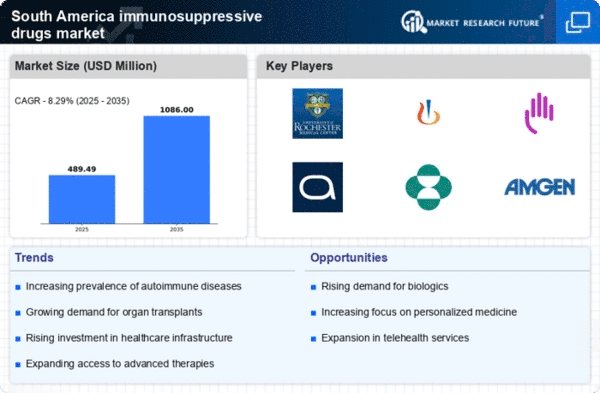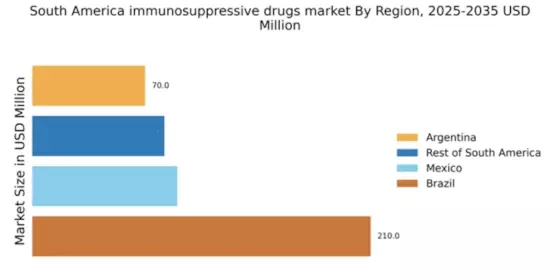Rising Healthcare Expenditure
The increase in healthcare expenditure across South America is a significant driver for the immunosuppressive drugs market. Governments and private sectors are investing more in healthcare infrastructure and services, which is facilitating better access to medications. As healthcare budgets expand, there is a greater focus on providing comprehensive treatment options for chronic diseases, including those requiring immunosuppressive therapies. Reports indicate that healthcare spending in several South American countries has risen by over 5% annually, reflecting a commitment to improving health outcomes. This financial investment is expected to enhance the availability and affordability of immunosuppressive drugs, thereby stimulating market growth.
Increasing Awareness and Education
There is a growing awareness and education regarding immunosuppressive therapies among healthcare professionals and patients in South America. This trend is fostering a better understanding of the benefits and risks associated with these medications, which is crucial for informed decision-making. Educational initiatives by healthcare organizations and pharmaceutical companies are playing a pivotal role in disseminating knowledge about the management of autoimmune diseases and transplant procedures. As awareness increases, more patients are likely to seek treatment, thereby driving demand within the immunosuppressive drugs market. This heightened awareness is expected to contribute to a more informed patient population, ultimately leading to improved health outcomes.
Regulatory Support for Drug Approvals
Regulatory bodies in South America are increasingly streamlining the approval processes for immunosuppressive drugs, which is positively impacting the market. Initiatives aimed at expediting the review and approval of new therapies are encouraging pharmaceutical companies to invest in the development of innovative immunosuppressive agents. This regulatory support is crucial, especially in a region where access to effective treatments can be limited. By reducing the time and costs associated with bringing new drugs to market, regulatory agencies are fostering a more dynamic environment for the immunosuppressive drugs market. This trend is likely to enhance the availability of advanced therapies for patients in need.
Advancements in Pharmaceutical Research
Innovations in pharmaceutical research are significantly influencing the immunosuppressive drugs market in South America. The development of novel drug formulations and delivery systems is enhancing the efficacy and safety profiles of immunosuppressive agents. For instance, the introduction of targeted therapies and biologics has transformed treatment paradigms, offering more personalized approaches to patient care. The investment in research and development by pharmaceutical companies is substantial, with expenditures reaching millions of $ annually. This commitment to innovation is expected to yield new therapies that address unmet medical needs, thereby expanding the market and improving patient access to advanced immunosuppressive treatments.
Growing Incidence of Autoimmune Diseases
The rising prevalence of autoimmune diseases in South America is a critical driver for the immunosuppressive drugs market. Conditions such as rheumatoid arthritis, lupus, and multiple sclerosis are becoming increasingly common, leading to a heightened demand for effective treatment options. According to recent health statistics, autoimmune diseases affect approximately 5-10% of the population in various South American countries. This growing patient population necessitates the development and availability of immunosuppressive therapies, which are essential for managing these chronic conditions. As healthcare providers seek to improve patient outcomes, the focus on innovative immunosuppressive drugs is likely to intensify, thereby propelling market growth in the region.


















Leave a Comment